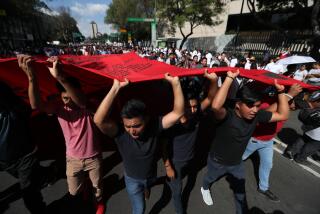Chileans honor those tortured, killed after 1973 military coup
- Share via
SANTIAGO, Chile -- Lighting candles, singing songs and carrying placards with photos of victims, Chileans gathered outside Santiago’s national football stadium to honor the thousands tortured and killed following the military coup that 40 years ago overthrew President Salvador Allende.
Hundreds of demonstrators laid red flowers Wednesday night at the gates of the stadium where many of the 4,000 victims killed or disappeared under the dictatorship of Gen. Augusto Pinochet met their fate. An estimated 40,000 Chileans were tortured under the brutal regime in the years following the coup on Sept. 11, 1973.
In the concrete hallway leading onto the football pitch, large black and white portraits hung on the usually bare walls showing the faces of men and women imprisoned or killed in the stadium.
For Antonio Mineris, 48, the day the military took over was still fresh in his mind.
“I was 7 years old when the coup happened. At first I didn’t realize what was going on,” Mineris said. “I was playing on the roof of my building with friends with sticks. Then a soldier on a roof nearby saw us and shot in our direction.”
Later that day, after a military curfew had been imposed, Mineris, whose home was close to the stadium, heard the first detainees being shot. “I heard the gunshots when the prisoners were being killed.Tah tah, tah tah,” he said.
For Maria Silva, 72, the stadium reminds her of everything that her family lost. Her brother Mario was killed in northern Chile and an older sister and a nephew were detained at the stadium and tortured. “I feel very bad because after 40 years there hasn’t been any justice,” she said.
Since democracy was restored in Chile in 1990, the whereabouts of more than a thousand missing people and presumed dead has never been revealed. After a broad amnesty was granted to military personnel while Pincochet was in power, fewer than 100 people have been convicted of human rights crimes.
Pinochet died in 2006 without having gone on trial and more than 1,000 legal cases alleging human rights abuses during his rule are yet to be concluded.
In a speech delivered at the Museum of Memory and Human Rights on Monday, Michelle Bachelet, a former president and torture victim who is favored to win the presidential election in November, said the country still needs more truth about what happened under Pinochet if it is to move forward.
“We need to know where the victims died and what happened to them for the minimum and undeniable right to grieve and to have a physical place to do it,” she said.
On Wednesday, center right President Sebastian Pinera attended a service in the chapel of the presidential palace, which was bombed during the coup, and called for reconciliation. Allende committed suicide in the palace rather than surrender to coup leaders.
“It is time, after 40 years, not to forget, but to overcome past traumas,” he said. “We have no right as a generation to pass on to our children and grandchildren the same hatred and arguments that divided us and caused so much pain to the generations that preceded us.”
Isabel Allende, a senator in Chile’s Socialist Party and the daughter of Salvador Allende, laid flowers at the foot of a statue of her father in Constitution Square while demonstrators pasted posters commemorating the anniversary on walls and park benches throughout the capital.
While most of Santiago remained peaceful, partly due to an enlarged police presence on the streets, violent clashes broke out in several neighborhoods in early hours Thursday.
Chilean police reported that 26 police officers had been injured by early Thursday and video footage broadcast by local news agencies showed cars and a bus ablaze while hooded individuals hurled Molotov cocktails in the direction of armored police vehicles.
Shops in the capital closed earlier than usual on Wednesday, many public transport routes were suspended and few people ventured out on the streets.
For 47-year-old Ramiro Diaz Tapia, the anniversary offered a valuable chance to educate the next generation of Chileans:
“What our parents and what my generation couldn’t build has to be done by this new generation,” he said, “and that is why they need to see what happened in a direct way.”
ALSO:
Apple fans in China find new iPhones costly
Israel also facing questions about chemical weapons
Prince William to leave the military, become full-time royal
Fison is a special correspondent.
More to Read
Sign up for Essential California
The most important California stories and recommendations in your inbox every morning.
You may occasionally receive promotional content from the Los Angeles Times.










